All Disease
Health Begins In The Gut.
It’s about more than treating gut symptoms.
It’s about optimizing every system of your body for energy, resilience, disease prevention, and longevity.
The first step?
Supporting hidden gut and microbiome issues—and their surprising symptoms that can manifest in every part of your body—with the help of one of the world’s foremost gut & microbiome health authorities.
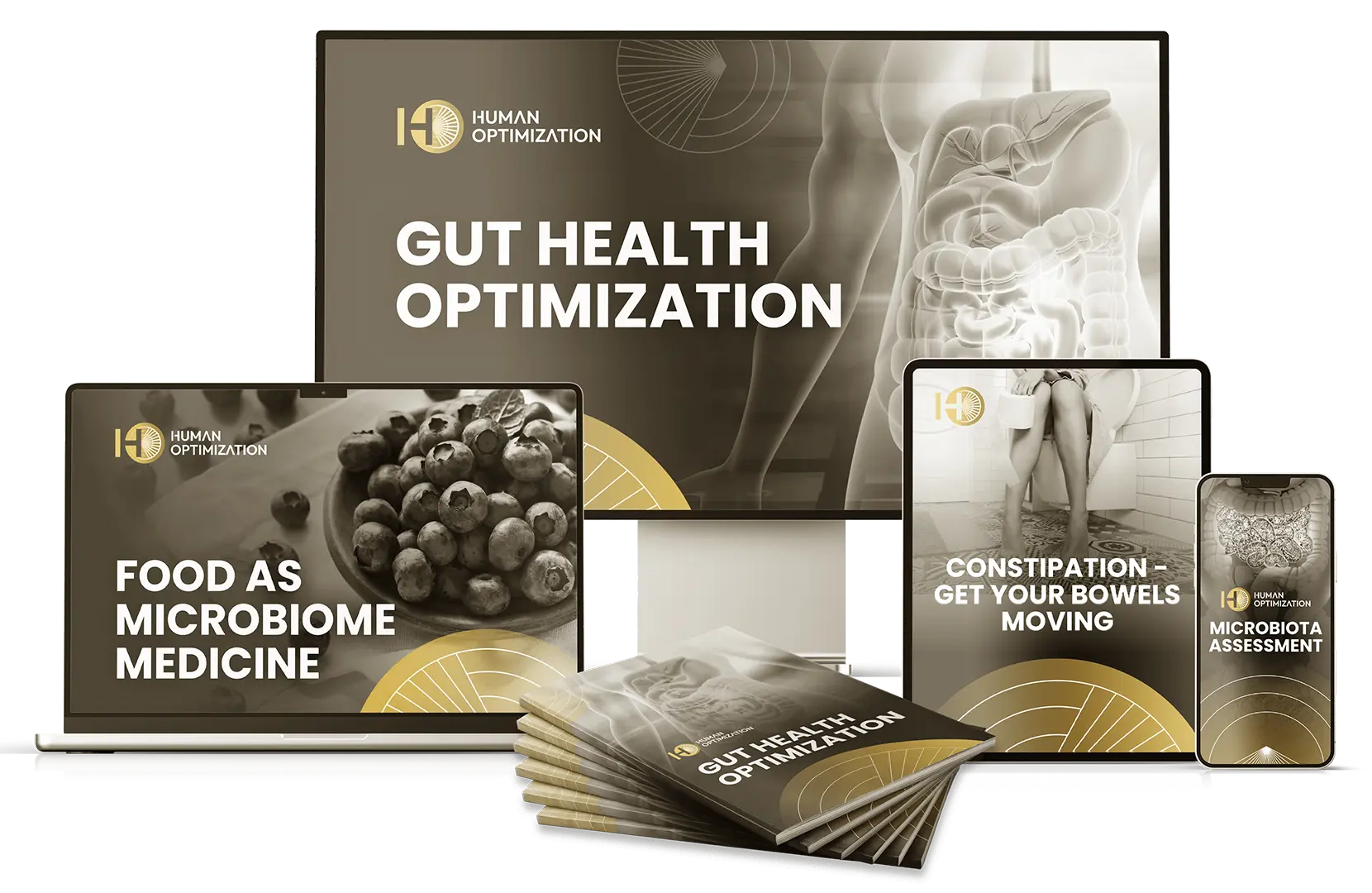

Heal your gut. Change your life.
Experience the most effective and evidence-based way to go from bloating, brain fog, and fatigue to vibrant, energetic, and excited for life.
Introducing the
Gut Health Optimization Program
In 16 research-based lessons you can...
Renew your gut | Optimize your health | Revitalize your life
It's About So Much More Than Bloating & Constipation...
A functional gut means...
- Finding the balanced weight & body composition you’ve been working toward (1).
- Metabolic flexibility to efficiently use carbs and fats for fuel (2).
- Enhanced insulin sensitivity so you have the energy you need to show up for your day (3).
- Improved mood & neurological function—no more anxious mornings or afternoon slumps (4).
- A fine-tuned immune system and appropriate inflammatory responses (5).
- Increased sex drive (6)!
- Vibrant skin with less blotchiness and fine lines (7).
- Exceptional nutrient absorption so you get more nourishment from your food (8).
- Protection from potential pathogens like the seasonal flu or traveler’s illness (9).
- Superior renal health to maintain proper acid/base balance and blood pressure as you age (10).
- Increased fertility in both males and females (11,12).
- Stronger bones & healthful aging (13).
- Strengthened detoxification pathways to protect you from everyday toxic exposures (14).

The Information In This Course Changed My Life.
I went from feeling completely hopeless about my rosacea and life-long GI symptoms to clear skin and no more emergency stops to use the bathroom.
I am so grateful!”
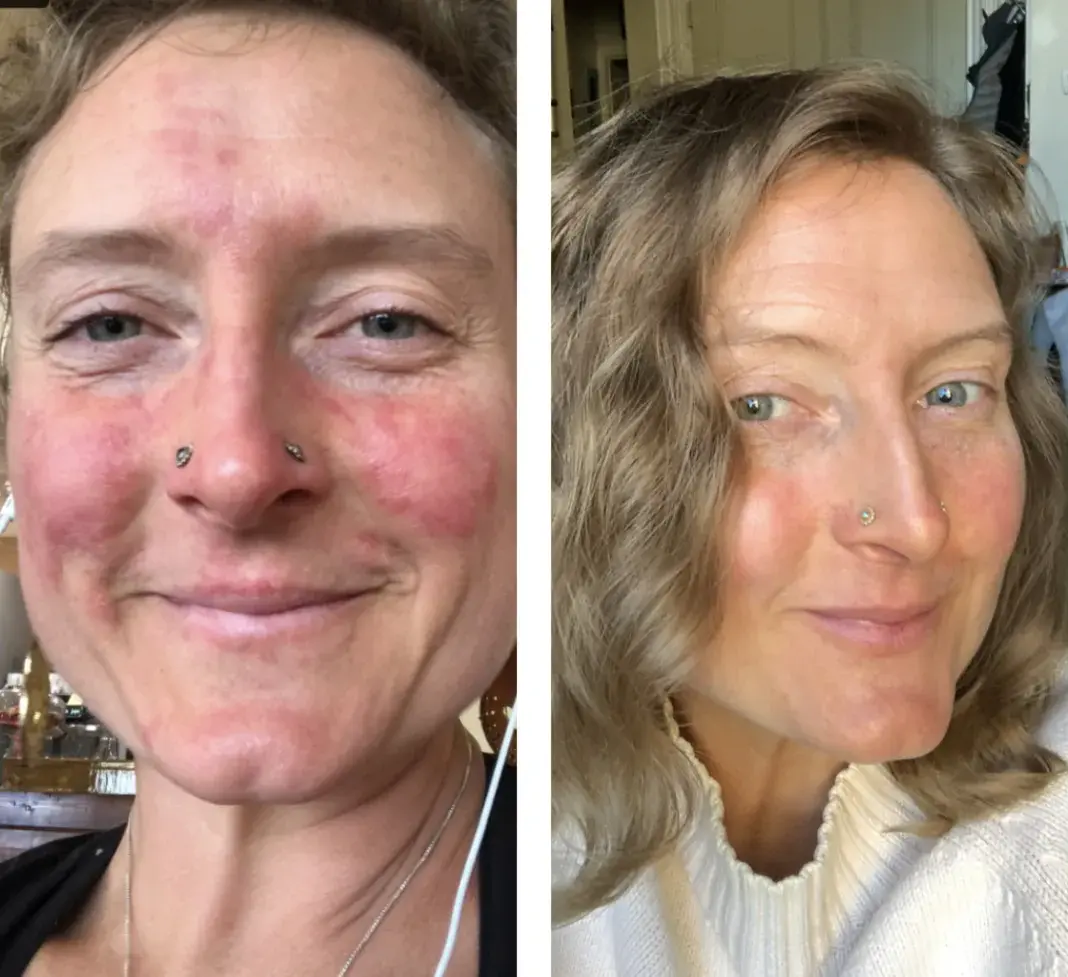
Victoria J.
Boston, MA
Gut Health Is Full-Body Health.
(It's even connected to your libido...)
The Gut + Mitochondria Connection
Sustained daily energy & metabolic flexibility

Emerging research has revealed the unique, bidirectional connection between mitochondria and gut microbiota (15). Mitochondria are well known for their crucial role in biochemical energy production, but they do much more than synthesize ATP. Mitochondrial health is also essential for longevity and disease prevention (16).
Experimental studies have demonstrated the ability of pathogenic bacteria to directly interfere with mitochondria, impairing healthy functioning and triggering abnormal mitochondrial fission (17). Specific metabolites of gut microbiota, such as trimethylamine‐N‐oxide (TMAO), have been linked to mitochondrial dysfunction and accelerated brain aging (18).
On the other hand, healthy gut microbes and the short-chain fatty acids they produce have been shown to benefit mitochondria. A 2022 animal study demonstrated the remarkable ability of short-chain fatty acids to improve mitochondrial energy production and prevent intestinal inflammation (19).
The Gut + Brain Connection
Sharper focus & balanced mood
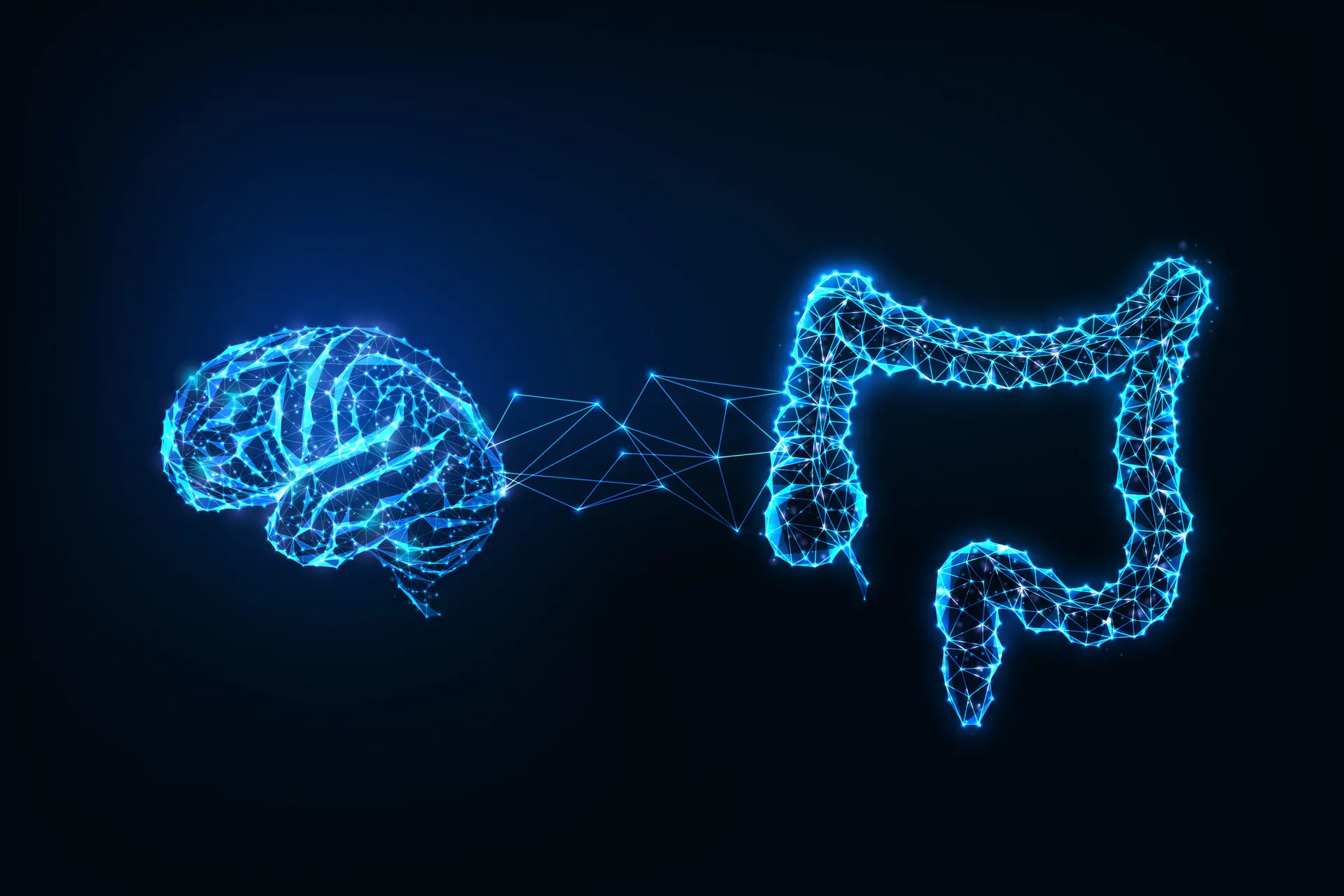
Known as the gut-brain axis, the intricate connection between the gut and brain is highly complex. It involves the central and autonomic nervous systems, brain, enteric nervous system, and the hypothalamic-pituitary-adrenal (HPA) axis, with the vagus nerve running a direct line of communication from the gut to the brain (20).
The gut microbiota and gut barrier have a profound influence on brain health. A 2022 systematic review of 70 peer-reviewed studies concluded that the gut-brain axis may contribute to depression and schizophrenia (21).
Probiotic and prebiotic studies show that balanced and diverse gut flora may improve cognition and mental well-being (22).
Healthy gut microbes produce neurotransmitters such as GABA, serotonin, dopamine, acetylcholine, and precursors to neurotransmitters. Notably, 90% of serotonin and 50% of dopamine are synthesized in the gut (23).
The Gut + Body Composition Connection
Leaner composition & increased muscle mass

The relationship between the digestive system and body composition is a newer but crucial area of research due to the deeply negative effect of muscle mass loss on quality of life, especially as you age.
However, this body of research is quickly growing—it’s clear that the health of the digestive system affects muscle growth and function (24).
Studies have found that mice with no microbiome have reduced transcription and expression of genes that regulate muscle protein synthesis, resulting in muscular atrophy.
However, when researchers transplanted healthy gut microbes into microbiome-free mice, their muscle atrophy began to reverse, significantly improving muscle health (25).
Even more interesting, obesity and leanness are influenced by the microbiome.
A fascinating twin experiment exploring the effects of the gut biome on body composition found that mice transplanted with flora from the obese twin had more adipose tissue and differing gene expression than mice transplanted with flora from the lean twin, regardless of diet (26).
However, when the mice were placed together, the sharing of microbes led to less fat mass and negative metabolic changes in the obese mice, i.e., the “lean” microbiome was dominant and transferable.
Recent studies on adults 65 years and older have found a strong association between the diversity of gut microbiota and age-related muscle loss, suggesting gut health is a key factor in skeletal muscle health and healthy aging. (27,28).
The Gut + Immune Connection
Pathogen protection & allergy avoidance
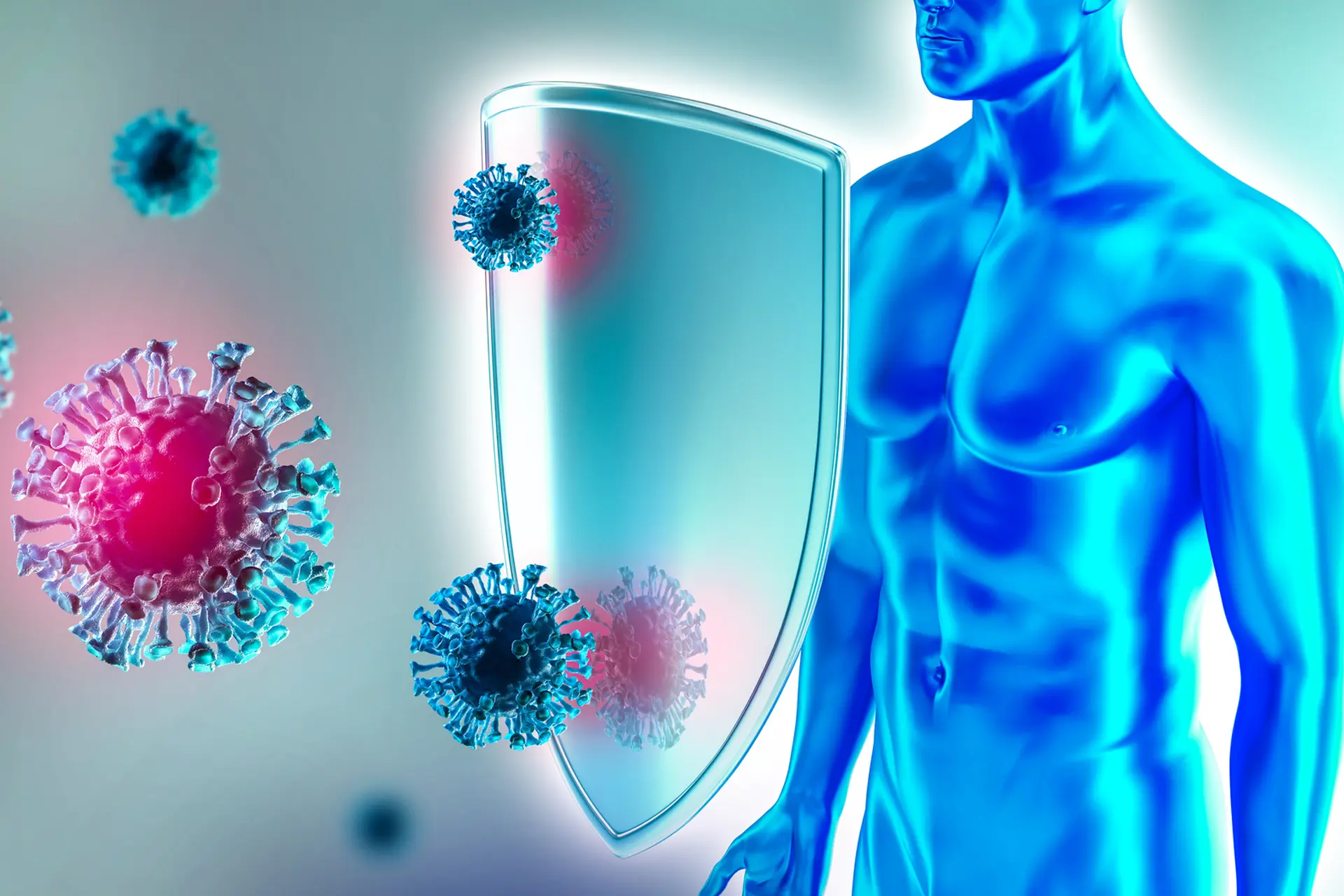
The gut houses an extensive community of immune cells, essential for neutralizing infectious pathogens, regulating the systemic immune system, and preventing food sensitivity and allergy (29). Fascinating research has shown the profound connection between the gut and food allergies, and strategies to combat gut dysbiosis may be an effective way to improve food tolerance (30).
The gut microbiota effectively communicates with these immune cells, triggering the inflammatory cascade necessary to fight harmful bacteria and viruses. At the same time, these gut microbes keep a tight rein on inflammation, preventing it from getting out of control. Because of this, gut health is also a mediating factor in autoimmunity development and prevention.
Diet and gut microbiome studies show that specific eating patterns, such as the Standard American Diet, may result in gut dysbiosis and an impaired immune system (29).
The Gut + Libido Connection
Greater sex drive & deeper desire

Various elements influence libido, including hormones, neurotransmitters, stress levels, and relationship dynamics. Emerging research shows that the gut microbiome also affects sex drive (31,32).
A 2021 case-control study found that women with self-reported low libido had altered gut microbiota that differed from those with healthy libido. Low libido was linked to significantly lower levels of Ruminococcaceae, a family of bacteria associated with a healthy microbiome (31).
Similarly, researchers have observed that men with erectile dysfunction have less diversity of gut microbiota when compared with healthy men of the same age (32).
Researchers don’t yet know the exact mechanisms behind the gut-libido connection, but it’s likely due to GI influences on the interplay of neurotransmitters, hormones, and inflammation.
The Gut + Skin Connection
Vibrant skin & wrinkle reduction

The connection between the gut and the skin has been referred to as the gut-skin axis due to the complex relationship between the microbiome, gut barrier, and skin health (33).
Healthy gut microbes produce anti-inflammatory compounds like short-chain fatty acids and retinoic acid that have beneficial effects on the skin, helping prevent premature aging and UV damage and even protecting against skin infections (34).
Alternatively, some research suggests that gut barrier dysfunction, also called leaky gut, may allow inflammatory and infectious compounds to enter the bloodstream and directly disturb skin homeostasis (35). Various studies have linked gut dysbiosis to skin conditions such as acne, psoriasis, eczema, and rosacea (36).
Strain-specific probiotics have been clinically studied for their ability to improve skin hydration and elasticity and reduce wrinkles, indicating that gut health has a profound effect on skin health (37).
The Gut + Fertility Connection
Stable hormones & healthy sperm

Unfortunately, rates of infertility are as high as 12% worldwide. The GI microbiome plays critical roles in both female and male fertility, so much so that some scientists refer to the microbiome as an endocrine organ (38).
In a two-part study examining male mice and male humans, transplantation of dysbiotic gut bacteria led to decreases in the development of healthy sperm and sperm’s ability to “swim,” i.e., sperm motility. In male humans, a strong connection was found between the dysbiotic bacterial genuses Bacteroides and Prevotella and sperm motility (39).
In females, the microbiome influences estrogen levels, disease states, such as PCOS and endometriosis, and fertility (40), with studies affirming that microbial patterns differ between fertile and infertile women (41,42). However, supporting a balanced GI environment may lead to positive changes in female fertility and associated disorders (43).
The Gut + Thyroid Connection
Autoimmune avoidance & robust metabolism
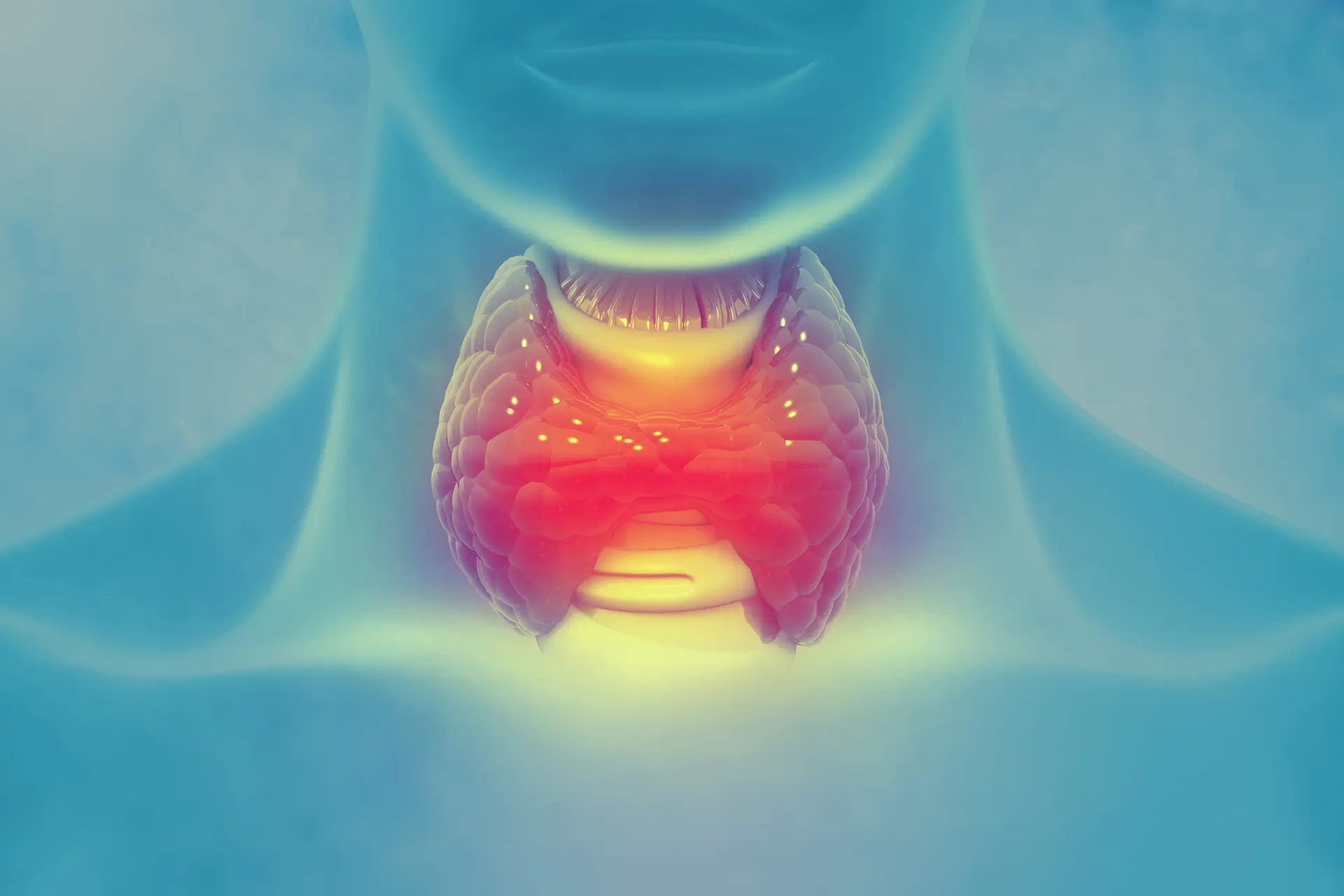
The thyroid-gut-axis has been a recognized physiological connection for nearly 100 years, evidenced by the co-occurrence of thyroid and gut disease states, the influence of the GI microbiome on thyroid function, and the crosstalk between gut microbes and thyroid hormones T4 and T3 (44).
For instance, the gut epithelium and microbiota of those with Hashimoto’s thyroiditis differ from those with healthy immune and thyroid functions (45).
Additionally, some researchers believe an earlier diagnosis of Grave’s disease could be possible by examining gut microbes and their metabolites (46).
An animal study exploring the relationship between the GI microbiome and thyroid hormones found that intestinal bacteria played roles in both the binding and breaking down of T4 and T3. Ultimately, the gut may substantially regulate thyroid hormones and their multiple systemic effects (47).
The gut + Aging Connection
Functional longevity & frailty prevention

Your GI microbiota shifts throughout life—most people experience big changes from birth to age three, stability until middle age, and then more variability and fast-paced change in late adulthood.
A less diverse microbiome is associated with frailty and accelerated aging, meaning fewer species of the bacteria, viruses, protozoa, and fungi that make up a healthy gut biome are present in more frail versus more vital older adults (48).
Amazingly, studies also reveal the specific microbes associated with robust health in aging individuals. The characteristics of healthy aging, such as high physical activity and low cognitive decline, may be heavily dependent on the presence of certain microbial species as you age (49,50).
The Gut + Detox Connection
Efficient clearance & less inflammation

The gut microbiota is closely connected to detoxification. When microbes are balanced, detox pathways are more capable of clearing pollutants, fungal biotoxins such as aflatoxin, drugs, and even hormones (51).
One in vivo study examined the effects of the microbiome on the detoxification enzyme CYP3A. This enzyme is responsible for the biotransformation of thousands of compounds so your body can optimally detoxify and clear waste from blood and tissues.
The researchers found that CYP3A activity was eight times lower in mice with no microbiome than mice with a healthy microbiome. They also found that other detoxification enzymes, CYP2C and glucuronosyltransferase, were influenced by the microbiome (52).

MEET YOUR INSTRUCTOR
Jason Hawrelak, ND, BNat(Hons), PhD, FNHAA, MASN, FACN
What Makes This Course Different?
Take a closer look.
Highlighed Lessons From 16 Total Lessons
The Gastrointestinal Microbiota: A Vital Human Organ
- Why humans are actually “super-organisms” and not just Homo sapiens
- The 6 vitamins and 3 minerals you might be lacking if gut flora is disturbed
- The surprising way you can get more nutrients from the food you’re already eating
- An acidic gut & colon health…what’s the connection?
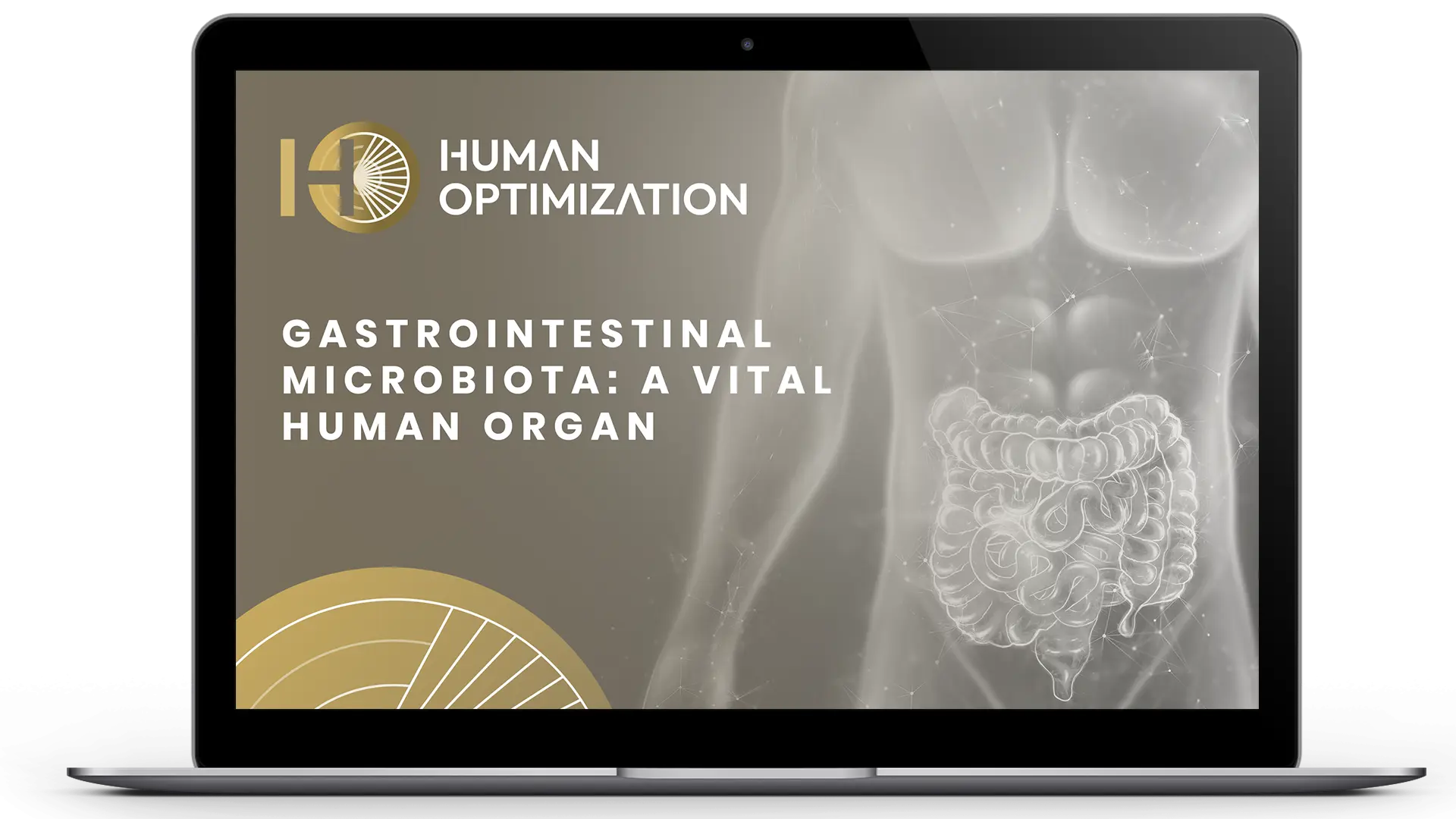
Dietary Drivers of Dysbiosis: Surprising Foods You Don't Expect
- A research-backed take on carbohydrates that no one is discussing
- The popular diet that can lead to the extinction of beneficial bacterial species in your GI tract
- The top 10 diagnoses associated with gut health…that having nothing to do with the digestive system
- Why dried fruit or frequent visits to the salad bar might be harming your gut
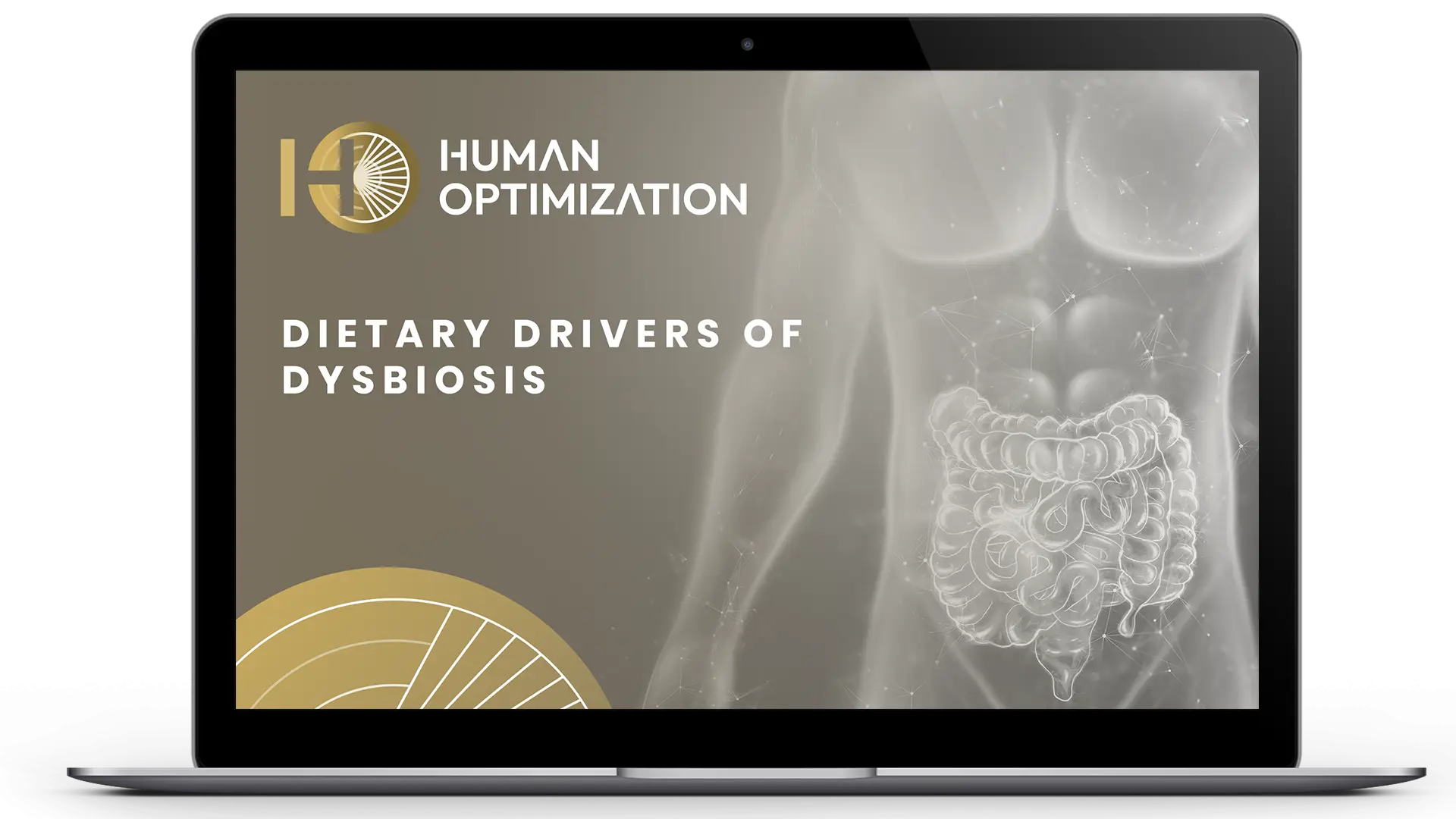
Microbiota Assessment: Understand Your Unique Biome
- 4 methods of GI testing—which one is right for you?
- Why tests alone aren’t enough to support your gut health
- Understanding if you have an extinct species or an underfed one
- Using testing to tailor your diet, supplement, & lifestyle regimen
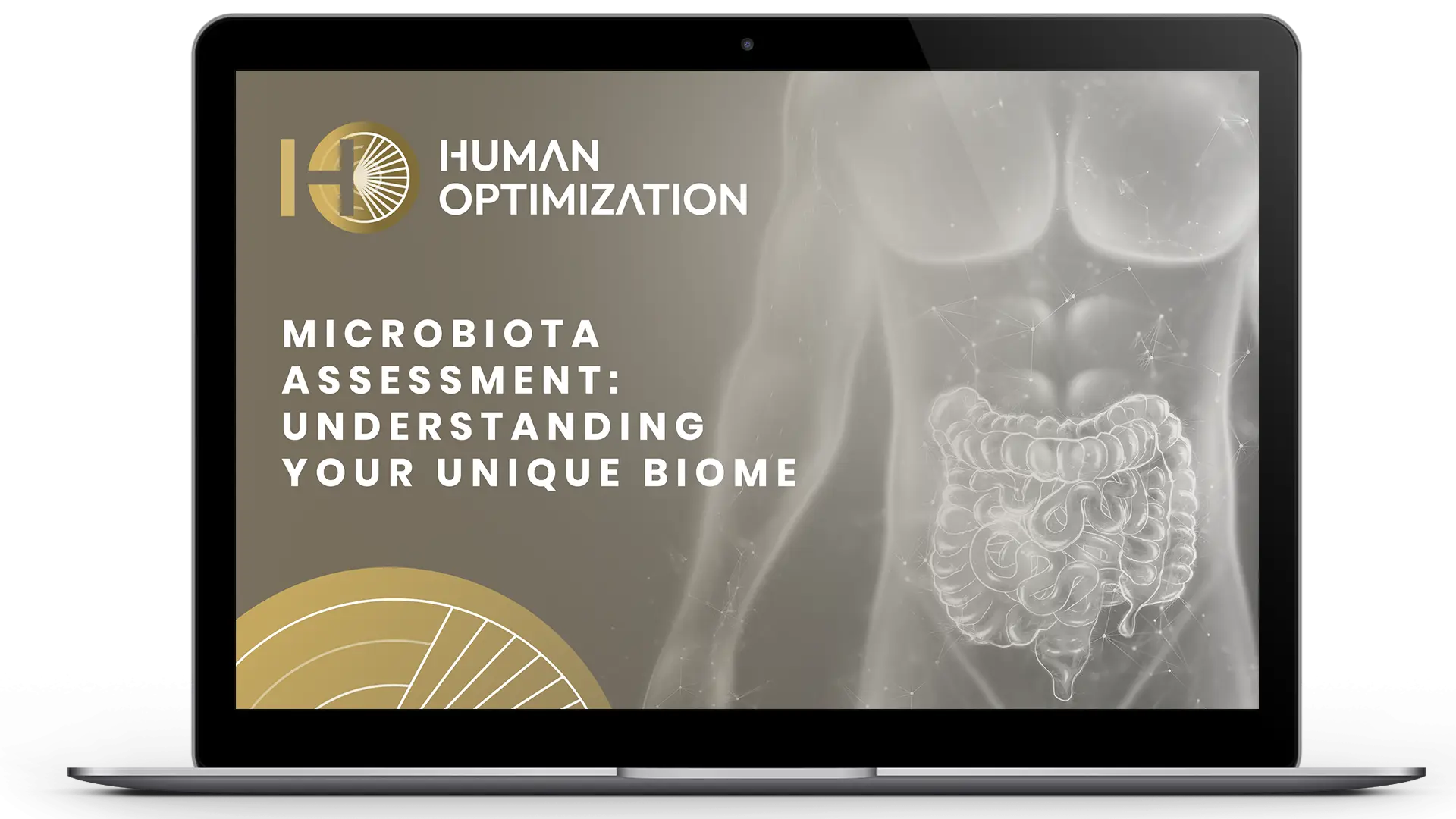
Food as Microbiome Medicine: Key Ways to Feed the Good Guys
- 10 “boring” vegetables that will bring your gut flora back to life
- The crucial link between fad diets and food allergies
- Easy-to-use gut supportive grocery lists
- The complex role of FODMAPs…and why they might be your friends
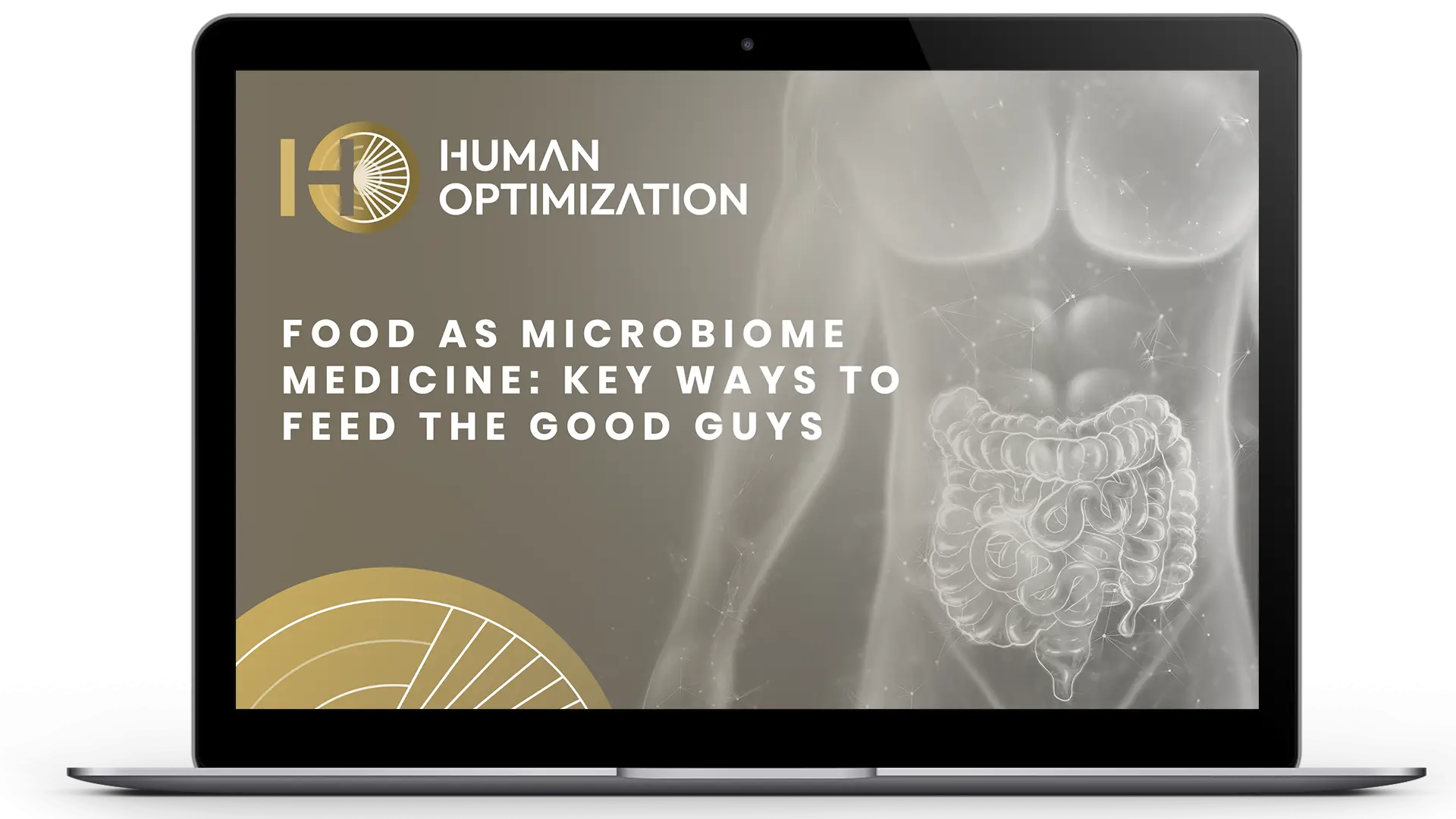
Probiotic Myth Busting: Resist The Hype & Follow The Research
- 5 constantly repeated probiotic myths that are holding your gut health hostage
- Why the best probiotics are found at your local drug store, not a fancy supplement company
- 2 practical tips you never knew about probiotics and antibiotics
- How to effectively use probiotics & why you should stop thinking of them as a gut “cure-all”
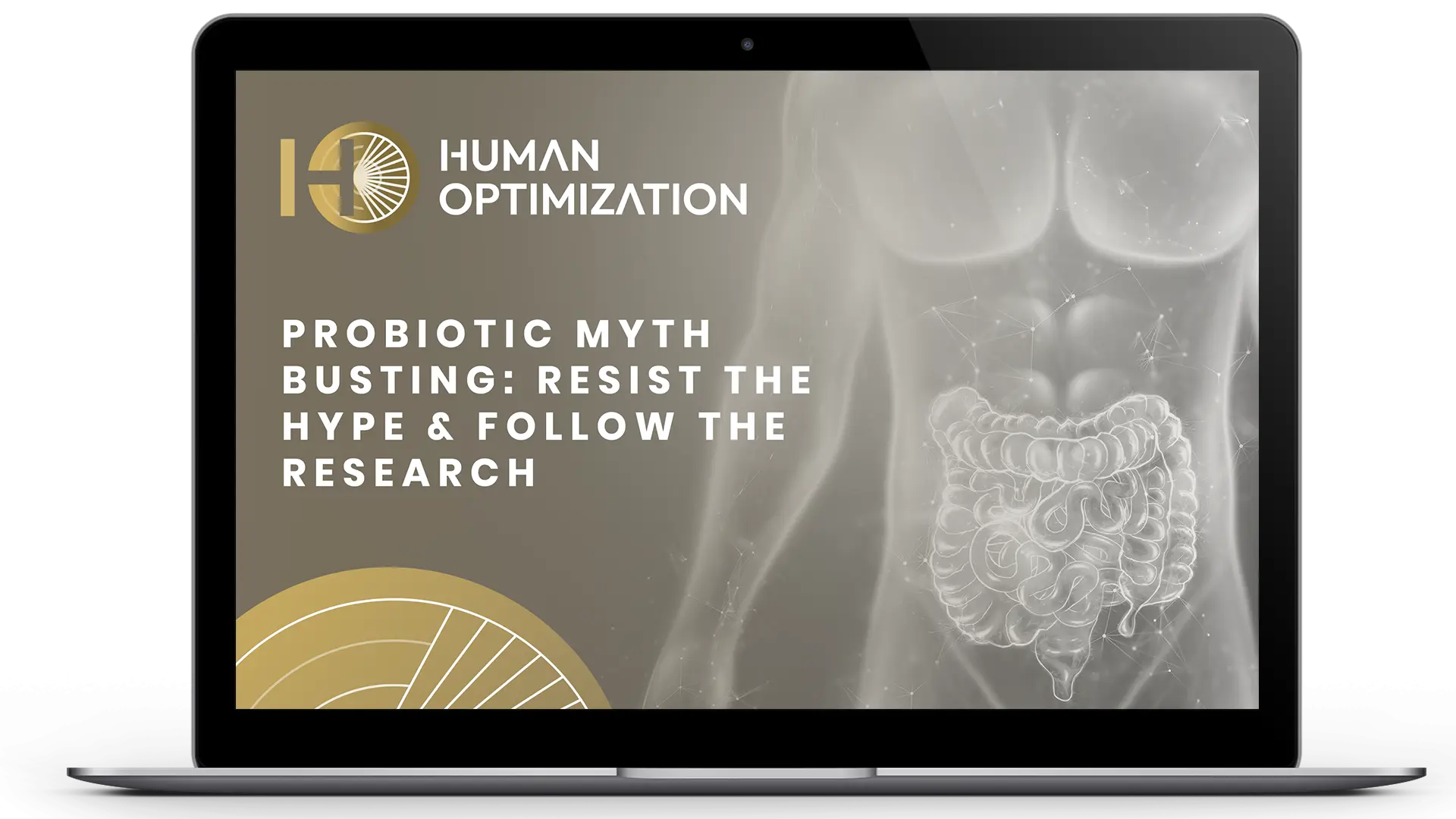
Leaky Gut: What It Is & How To Address It
- 6 evidence-based compounds that “heal and seal” the gut lining
- Why yeast might be the best solution for leaky gut
- The special supplement combination that every athlete should be using to protect their gut
- Saturated fat & leaky gut…the link you might be missing
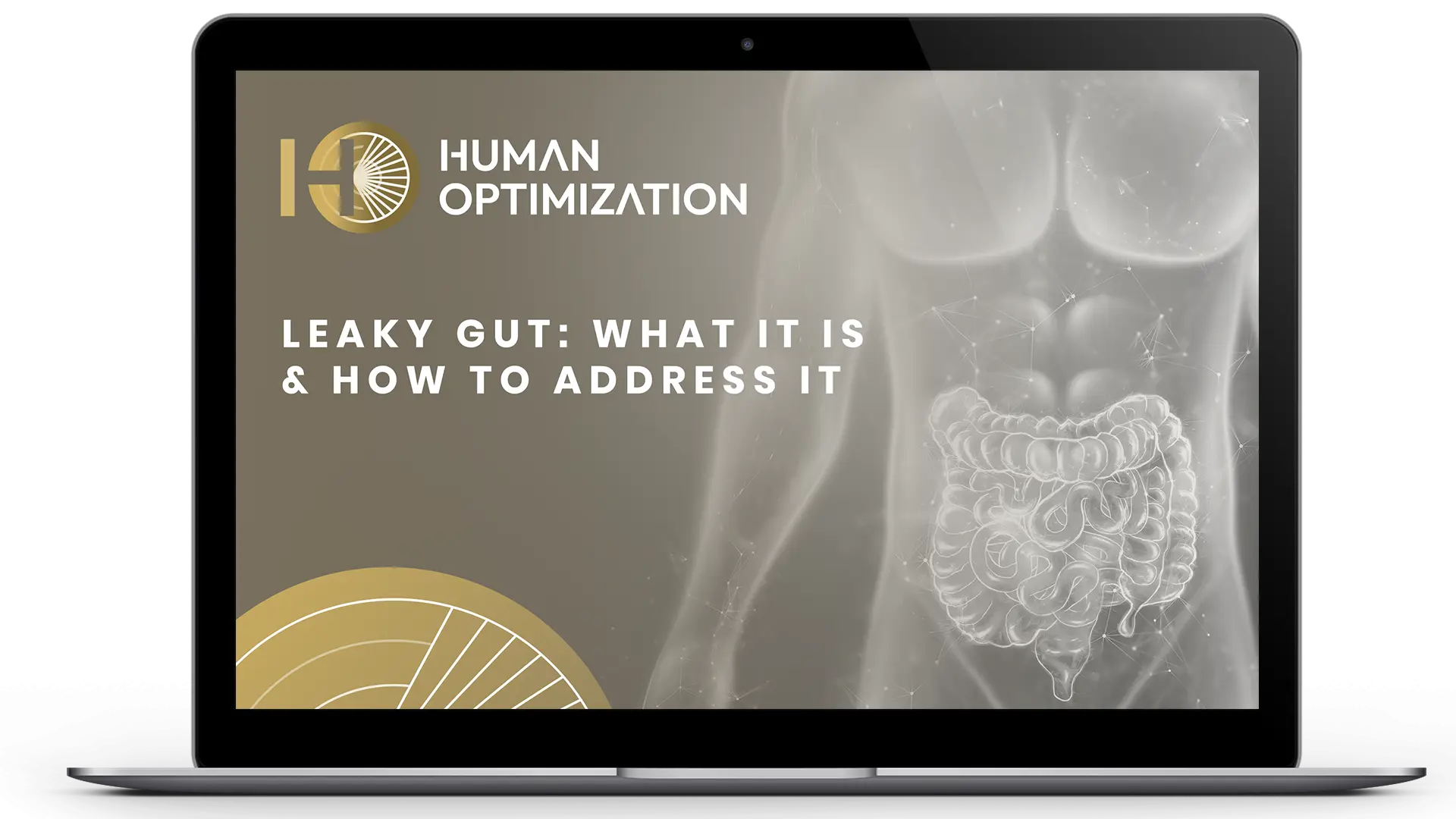
Plus... Bonus Video & Gut Health Flow Chart: Your Next Step At A Glance
Dr. Hawrelak personally guides you through this first-of-its-kind symptom flowchart so you can quickly determine the exact step of your gut healing journey.
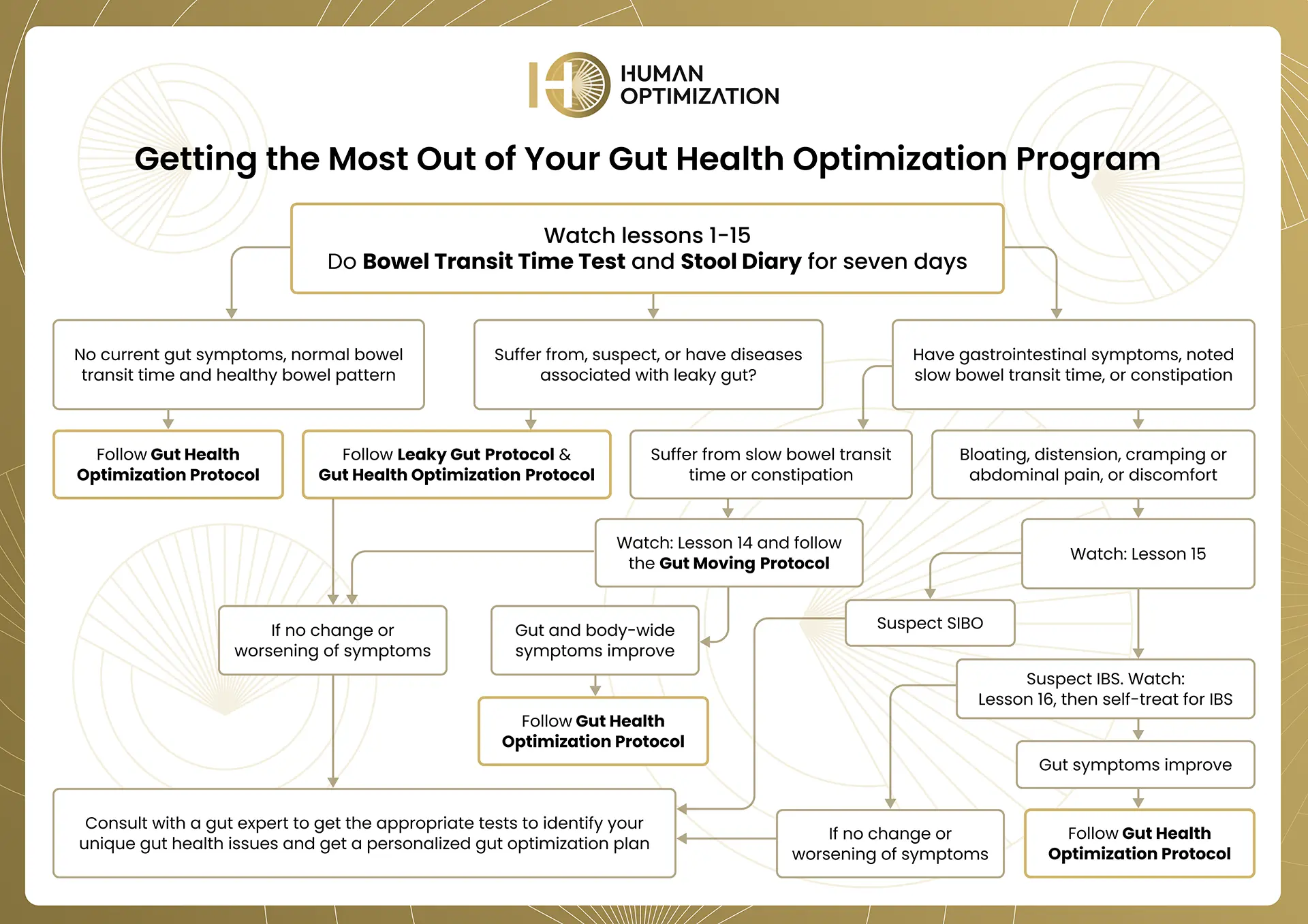
Gut Health Optimization
Here is everything you get when you invest in the program today...

Your Investment $497 $297 (One-Time Payment)
- 16 self-paced lessons presented by Dr. Jason Hawrelak, ND, BNat(Hons), PhD, FNHAA, MASN, FACN
VALUE $500
- Over 6 hours of expert content you can easily personalize with Dr. Hawrelak's Gut Health Flow Chart covering everything you need to know about gut health, from the real story on pre- and probiotics to what's actually happening in SIBO and IBS.
VALUE $500
- Evidence-based solutions covering foods, lifestyle improvements, and assessments to support your gut.
VALUE $300
- The satisfaction of optimizing your gut...and your life.
PRICELESS
TOTAL RETAIL VALUE: $1,300
YOU GET IT ALL FOR JUST: $297
Normally $497 - Limited Time For $297
Payment Plan Available If Needed
FAQs
How long does it take to heal the gut? I've heard it takes years!
Every person is different. We encourage you to consider the number of years your gut was stressed—it likely won’t take that long to unravel some of the damage!
The good news is that you can start improving your gut health—and systemic health—today with the simple but powerful food and lifestyle changes you’ll learn in this course.
What if I can't afford expensive probiotics?
That’s ok! Some of the most effective gut-supportive foods are found in the produce section of your grocery store. We’ll teach you exactly what (affordable) foods to incorporate.
Are you sure I'll understand the curriculum? I'm not a scientist.
Yes! You will absolutely be able to understand and easily apply each lesson in the course.
The curriculum is based on thousands of studies, but written in a way that is practical, user-friendly, and, most importantly, effective.
I've seen advertisements for so many gut courses. How is this one different?
We understand we’ve seen those ads, too.
That’s why we decided to work with the most respected and evidence-based gut-focused clinician in the world to create the Gut Health Optimization Program.
The information you’ll learn will look a lot different from what you’ve heard in the past! That’s because it’s not based on trends—it’s based on research and clinical experience that works.
I've been dealing with my symptoms for so long—will supporting my gut really help?
We can’t know your exact health picture, but we do know that the health of the gut and the microbiome influence countless parts of your physiology.
Think of it this way: Taking care of your gut with the research-based methods in the Gut Health Optimization Program will only work to improve your well-being. And these methods might be the missing pieces you’ve been searching for!
How long will it take to complete the course?
Some excited participants finish the course in just one day!
But we recommend taking your time and pacing the lessons over approximately 4 weeks. So, you’ll complete 4 weekly lessons for 4 weeks, equaling the complete 16 lessons.
When nothing else has worked...
it's time to heal your gut.
References
- Institute of Medicine (US) Food Forum. The Human Microbiome, Diet, and Health: Workshop Summary. Washington (DC): National Academies Press (US). Influence of the Microbiome on the Metabolism of Diet and Dietary Components. 2014.
- Martin AM, Sun EW, Rogers GB, Keating DJ. The Influence of the Gut Microbiome on Host Metabolism Through the Regulation of Gut Hormone Release. Front Physiol. 2019;10:428.
- Caricilli AM, Saad MJ. The role of gut microbiota on insulin resistance. Nutrients. 2013;5(3):829-851.
- Huang TT, Lai JB, Du YL, Xu Y, Ruan LM, Hu SH. Current Understanding of Gut Microbiota in Mood Disorders: An Update of Human Studies. Front Genet. 2019;10:98.
- Al Bander Z, Nitert MD, Mousa A, Naderpoor N. The Gut Microbiota and Inflammation: An Overview. Int J Environ Res Public Health. 2020;17(20):7618.
- Li G, Li W, Song B, et al. Differences in the Gut Microbiome of Women With and Without Hypoactive Sexual Desire Disorder: Case Control Study. J Med Internet Res. 2021;23(2):e25342.
- Ratanapokasatit Y, Laisuan W, Rattananukrom T, Petchlorlian A, Thaipisuttikul I, Sompornrattanaphan M. How Microbiomes Affect Skin Aging: The Updated Evidence and Current Perspectives. Life (Basel). 2022;12(7):936.
- Krajmalnik-Brown R, Ilhan ZE, Kang DW, DiBaise JK. Effects of gut microbes on nutrient absorption and energy regulation. Nutr Clin Pract. 2012;27(2):201-214.
- Ubeda C, Djukovic A, Isaac S. Roles of the intestinal microbiota in pathogen protection. Clin Transl Immunology. 2017;6(2):e128.
- Pluznick JL. Gut microbiota in renal physiology: focus on short-chain fatty acids and their receptors. Kidney Int. 2016;90(6):1191-1198.
- Qi X, Yun C, Pang Y, Qiao J. The impact of the gut microbiota on the reproductive and metabolic endocrine system. Gut Microbes. 2021;13(1):1-21.
- Magill RG, MacDonald SM. Male infertility and the human microbiome. Front Reprod Health. 2023;5:1166201.
- Ding K, Hua F, Ding W. Gut Microbiome and Osteoporosis. Aging Dis. 2020;11(2):438-447.
- Dempsey JL, Cui JY. Microbiome is a functional modifier of P450 drug metabolism. Curr Pharmacol Rep. 2019;5(6):481-490.
- Zhu Y, Li Y, Zhang Q, Song Y, Wang L, Zhu Z. Interactions Between Intestinal Microbiota and Neural Mitochondria: A New Perspective on Communicating Pathway From Gut to Brain. Front. Microbiol. 2022;13:798917.
- Giorgi C, Marchi S, Simoes ICM, et al. Mitochondria and Reactive Oxygen Species in Aging and Age-Related Diseases. Int Rev Cell Mol Biol. 2018;340:209-344.
- Stavru F, Bouillaud F, Sartori A, Ricquier D, Cossart P. Listeria monocytogenes transiently alters mitochondrial dynamics during infection. Proc Natl Acad Sci U S A. 2011;108(9):3612-3617.
- Li D, Ke Y, Zhan R, et al. Trimethylamine-N-oxide promotes brain aging and cognitive impairment in mice. Aging Cell. 2018;17(4):e12768.
- Su SH, Wu YF, Lin Q, Zhang L, Wang DP, Hai J. Fecal microbiota transplantation and replenishment of short-chain fatty acids protect against chronic cerebral hypoperfusion-induced colonic dysfunction by regulating gut microbiota, differentiation of Th17 cells, and mitochondrial energy metabolism. J Neuroinflammation. 2022;19(1):313.
- Carabotti M, Scirocco A, Maselli MA, Severi C. The gut-brain axis: interactions between enteric microbiota, central and enteric nervous systems. Ann Gastroenterol. 2015;28(2):203-209.
- Arneth BM. Gut-brain axis biochemical signalling from the gastrointestinal tract to the central nervous system: gut dysbiosis and altered brain function. Postgrad Med J. 2018;94(1114):446-452.
- Ansari F, Pourjafar H, Tabrizi A, Homayouni A. The Effects of Probiotics and Prebiotics on Mental Disorders: A Review on Depression, Anxiety, Alzheimer, and Autism Spectrum Disorders. Curr Pharm Biotechnol. 2020;21(7):555-565.
- Chen Y, Xu J, Chen Y. Regulation of Neurotransmitters by the Gut Microbiota and Effects on Cognition in Neurological Disorders. Nutrients. 2021;13(6):2099.
- Lahiri S, Kim H, Garcia-Perez I, et al. The gut microbiota influences skeletal muscle mass and function in mice. Sci Transl Med. 2019;11(502):eaan5662.
- Ridaura VK, Faith JJ, Rey FE, et al. Gut microbiota from twins discordant for obesity modulate metabolism in mice. Science. 2013;341(6150):1241214.
- Picca A, Ponziani FR, Calvani R, et al. Gut Microbial, Inflammatory and Metabolic Signatures in Older People with Physical Frailty and Sarcopenia: Results from the BIOSPHERE Study. Nutrients. 2019;12(1):65.
- Castro-Mejía JL, Khakimov B, Krych Ł, et al. Physical fitness in community-dwelling older adults is linked to dietary intake, gut microbiota, and metabolomic signatures. Aging Cell. 2020;19(3):e13105.
- Zheng D, Liwinski T, Elinav E. Interaction between microbiota and immunity in health and disease. Cell Res. 2020;30(6):492-506.
- Zhongliang W, Jinghua Z, Xuanyi M, Jinyan G, Hong L, Jinlv S, et al. The gut microbiome-immune axis as a target for nutrition-mediated modulation of food allergy. Trends in Food Science & Technology. 2021;114:116 32.
- Li G, Li W, Song B, et al. Differences in the Gut Microbiome of Women With and Without Hypoactive Sexual Desire Disorder: Case Control Study. J Med Internet Res. 2021;23(2):e25342.
- Geng Q, Chen S, Sun Y, et al. Correlation between gut microbiota diversity and psychogenic erectile dysfunction. Transl Androl Urol. 2021;10(12):4412-4421.
- Salem I, Ramser A, Isham N, Ghannoum MA. The Gut Microbiome as a Major Regulator of the Gut-Skin Axis. Front Microbiol. 2018;9:1459.
- Lee YB, Byun EJ, Kim HS. Potential Role of the Microbiome in Acne: A Comprehensive Review. J Clin Med. 2019;8(7):987.
- De Pessemier B, Grine L, Debaere M, Maes A, Paetzold B, Callewaert C. Gut-Skin Axis: Current Knowledge of the Interrelationship between Microbial Dysbiosis and Skin Conditions. Microorganisms. 2021;9(2):353.
- Ratanapokasatit Y, Laisuan W, Rattananukrom T, Petchlorlian A, Thaipisuttikul I, Sompornrattanaphan M. How Microbiomes Affect Skin Aging: The Updated Evidence and Current Perspectives. Life (Basel). 2022;12(7):936.
- Komiya S, Naito Y, Okada H, et al. Characterizing the gut microbiota in females with infertility and preliminary results of a water-soluble dietary fiber intervention study. J Clin Biochem Nutr. 2020;67(1):105-111.
- Ding N, Zhang X, Zhang XD, Jing J, Liu SS, Mu YP, et al. Impairment of spermatogenesis and sperm motility by the high-fat diet-induced dysbiosis of gut microbes. Gut. 2020;69:1608-1619.
- Chadchan SB, Singh V, Kommagani R. Female reproductive dysfunctions and the gut microbiota. J Mol Endocrinol. 2022;69(3):R81-R94.
- Wee BA, Thomas M, Sweeney EL, et al. A retrospective pilot study to determine whether the reproductive tract microbiota differs between women with a history of infertility and fertile women. Aust N Z J Obstet Gynaecol. 2018;58(3):341-348.
- Campisciano G, Florian F, D’Eustacchio A, et al. Subclinical alteration of the cervical-vaginal microbiome in women with idiopathic infertility. J Cell Physiol. 2017;232(7):1681-1688.
- Knezevic J, Starchl C, Tmava Berisha A, Amrein K. Thyroid-Gut-Axis: How Does the Microbiota Influence Thyroid Function?. Nutrients. 2020;12(6):1769.
- Liu J, Qin X, Lin B, et al. Analysis of gut microbiota diversity in Hashimoto’s thyroiditis patients. BMC Microbiol. 2022;22(1):318.
- Liu H, Liu H, Liu C, Shang M, Wei T, Yin P. Gut Microbiome and the Role of Metabolites in the Study of Graves’ Disease. Front Mol Biosci. 2022;9:841223.
- DiStefano JJ 3rd, de Luze A, Nguyen TT. Binding and degradation of 3,5,3′-triiodothyronine and thyroxine by rat intestinal bacteria. Am J Physiol. 1993;264(6 Pt 1):E966-E972.
- Jackson MA, Jeffery IB, Beaumont M, et al. Signatures of early frailty in the gut microbiota [published correction appears in Genome Med. 2016;8(1):21. Jackson, Matt [corrected to Jackson, Matthew A]]. Genome Med. 2016;8(1):8.
- Boehme M, Guzzetta KE, Bastiaanssen TFS, et al. Microbiota from young mice counteracts selective age-associated behavioral deficits. Nat Aging. 2021;1(8):666-676.
- Ghosh TS, Shanahan F, O’Toole PW. The gut microbiome as a modulator of healthy ageing. Nat Rev Gastroenterol Hepatol. 2022;19(9):565-584.
- Liew WP, Mohd-Redzwan S, Than LTL. Gut Microbiota Profiling of Aflatoxin B1-Induced Rats Treated with Lactobacillus casei Shirota. Toxins (Basel). 2019;11(1):49.
- Togao M, Kawakami K, Otsuka J, Wagai G, Ohta-Takada Y, Kado S. Effects of gut microbiota on in vivo metabolism and tissue accumulation of cytochrome P450 3A metabolized drug: Midazolam. Biopharm Drug Dispos. 2020;41(7):275-282.



